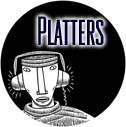
Comment
on this story
|
 |

This Week: AEC’s performance art, Bruford’s acoustic quartet, and E.S.T.’s musical wallpaper
Art Ensemble of Chicago
Live in Paris (Varese)
The year 1969 was an auspicious one for the Art Ensemble of Chicago and its GREAT BLACK MUSIC—ANCIENT TO THE FUTURE. While fusion commenced ascendance, the AEC decamped under-appreciated from Chicago for Paris, where it remained for 18 months to perform widely and to great acclaim, as well as to record some 11 albums, including this live performance. Despite the AEC’s assertion that their music wasn’t jazz, rather the aforementioned GBM—ATTF, the jazz community was unconvinced, laying claim to the band’s eclecticism while raising an eyebrow at its postmodern minstrelsy.
The AEC is as much performance art as anything else, what with the face paint, stage shenanigans, fancy outfits, hundreds of instruments of every imaginable variety, and Lester Bowie’s unforgettable white lab coat. This performance—unfortunately recorded before the ascetic yet nonetheless considerate attentions the ECM label would inflict (a fond sigh for 1981’s live recording Urban Bushmen)—is sonically attenuated, although the basic elements remain: Roscoe Mitchell and Joseph Jarman on saxes, Lester Bowie trumpet, Malachi Favors bass, and this being recorded before Don Moye, a formal percussionist, had joined, all four on a strikeable infinitude. And add one Fontella Bass (Bowie’s spouse at the time), who contributes funky vocals to the second of two tunes contained here, “Bon Voyage” (the other tune, also roughly 45 minutes in duration, aptly entitled “Oh, Strange”).
In Paris is indeed a strange 90-minute ride, at turns synthetically futuristic sounding, despite the acoustic instrumentation, as well as primitive, the result of the African thumb piano and its cousins. In between live Bowie’s trumpet growls more suited to the ’20s, someone persisting on the banjo (going back to the previous century), alongside Bass singing lustily of love. Thirty-five years after the fact, the parody and pathos still persist.
—Jonathan B. Frey
Bill Bruford’s Earthworks
Random Acts of Happiness (Summerfold)
This is Bruford’s fourth album at the helm of an acoustic quartet, and one may infer that the ex-rock vet is entirely in his creative element at this point. Supportive, elegant, and metrically fearless, his drumming has never sounded more accomplished, although this might be an illusion granted by his crack band. Pianist Steve Hamilton and bassist Mark Hodgson are adept enough at negotiating the rhythmic maps of typical Earthworks fare, and Hamilton’s harmonic color-commentary is superlative. Reed player Tim Garland comes aboard for this record, bringing along bass clarinet, flute, and some new tunes to boot.
Recorded live at Yoshi’s, the program is a busy one. Garland’s material bears the imprint of his former employer Chick Corea—convoluted melodies and sophisticated but polite chord changes that can get the band pleasantly wired. There’s a dramatic sensibility in the themes and extended structures of “Speaking in Wooden Tongues” and “White Knuckle Wedding,” aided by Bruford contributing log drum to both, while Garland runs his sax and flute through a harmonizer effect. “Bajo del Sol” is a masterpiece, swinging from a sinewy bass clarinet theme into a triple meter dance that sounds like Coltrane’s quartet via the British Isles. Garland’s soprano turn gets intense, and Bill’s drum and handclap postlude is worth a rewind or six.
Elsewhere, Bruford resurrects some pages from his old songbook, updating a couple of choice tunes from his ’70s fusion band and the (electric) Earthworks Mach 1. It’s fun to hear something like the episodic “One of a Kind” in a more intimate context, and it does underscore the compatibility and progression of one of the percussion world’s distinctive résumés.
—Chris Mitchell
E.S.T.
Seven Days of Falling (ACT)
The Esbjorn Svensson Trio’s penchant theme is overtly growing urgency, achieved by increasing tempo, tone, dynamics, and density throughout a tune’s duration. Its most classic manifestation is the both thrilling and self-satirizing cut “Behind the Yashmak” from their 2002 release, Strange Place for Snow. Containing many E.S.T. signature ingredients—synths, piano treatments, Jarrettesque piano ruminations, an absurdly simple yet pleasing melody—the tune extends over 10 minutes to develop from time-signatureless electronica, tabla, and probing bass, to spacey piano clusters above a steadily increasing tempo, to finally a repeated and rising harmonic propelled by clattering, >180 beat per minute drums all of which ceases abruptly, like the power’s been cut. It’s the ultimate recognition that there’s really nowhere else to go, and at a certain point no elegant way to close.
Seven Days of Falling continues where the previous recording left off, another collection of originals, most catchy, some danceable, and many including elements of the growing urgency theme, notably “Elevation of Love” (the obvious orgasmic associations having finally surfaced in a tune title). And while these ingredients, combined with a decidedly rock rhythmic feel (drummer Ostrom is more Gadd than Dejohnette), are responsible for E.S.T.’s broad popularity, they also serve as grounds for dismissing the trio as perhaps fun but in essence lightweight, a variety of musical wallpaper.
Such a conclusion would not be universally applicable, as much of E.S.T.’s output tolerates well repeated, close listening, although—like so much piano trio music—not entirely able to resist relegation to background music. Especially fine on this recording is the shifting variety on “Mingle in the Mincing-Machine” and the slow blues ballad, a surprising contrast on this CD, “Believe Bereft Below.”
—Jonathan B. Frey

March 25, 2004 • Vol. 14, No. 13
© 2004 Metro Pulse
|